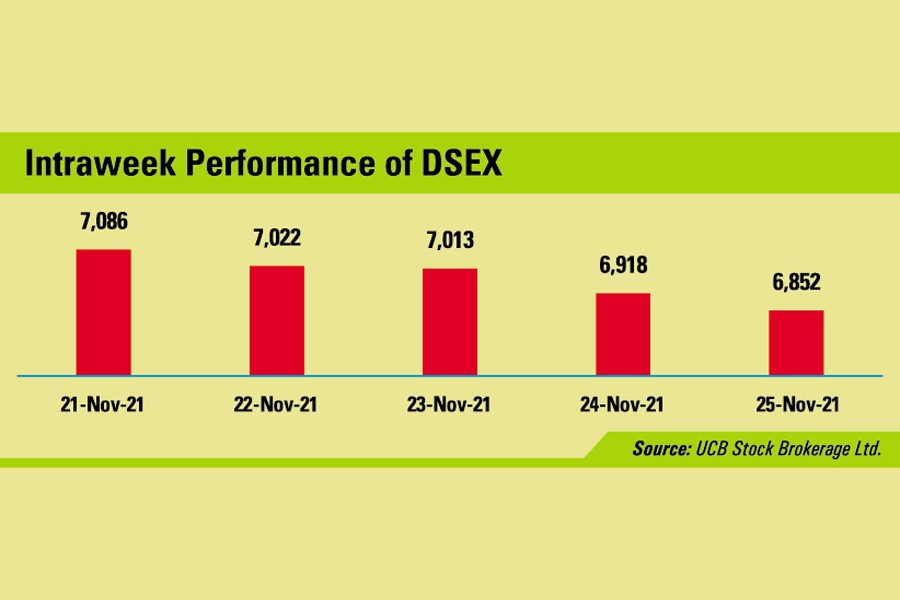Stocks suffered a massive drop in the outgoing week as investors dumped their holdings of major sector shares amid fears of further price erosion.
The market bled throughout the week as panic gripped investors following the news that non-performing loans in the banking sector have swelled at a high rate.
DSEX, the benchmark index of the Dhaka Stock Exchange (DSE), plunged 239.73 points or 3.38 per cent to settle the week at 6,852, after gaining 185 points in the past two straight weeks.
The prime bourse also saw the market capitalisation shed 2.67 per cent or Tk 150 billion during the week to reach Tk 5,460 billion on Thursday.
The market took a massive drop amid remarkable selling pressure from the beginning of the week, creating panic among the investors who mostly dumped banking issues, said a merchant banker.
The heavyweight banking sector showed the worst performance last week after the news of increased bad loans and a cash crunch at several banks came out, he said.
The non-performing loans in Bangladesh's banking system swelled to more than Tk 1.0-trillion mark again, as of September, despite receiving state policy support, Bangladesh Bank data showed.
As the banking sector has a huge capital base, its bleeding had a massive impact on the overall index, said the merchant banker.
The banking sector suffered the most among all major sectors, losing 5.40 per cent. Poor performance in the banking sector was taking a serious toll on the index.
A section of investors were quite shaky as they think that the money market is under some liquidity pressure, according to a market analyst.
"If the money market suffers from a liquidity shortage, then it spills over to the stock market," he said.
He, however, has expressed optimism about the revival of the stock market.
Investors got engaged in panic-driven sales as the liquidity scenario in the money market is tightening and the rising inflation rate is expected to adversely impact macroeconomic indicators, commented EBL Securities.
The stockbroker noted that initiatives to inject fresh funds in the market by the institutional investors failed to dissuade investors from selling their holdings.
The banking sector dominated the turnover chart, accounting for 38 per cent of the week's total turnover, with five banks featuring in the weekly top 10 turnover list.
However, the week's total turnover dropped to Tk 63.06 billion on the prime bourse as against Tk 69.92 billion in the week before.
The daily turnover averaged out at Tk 12.61 billion on the DSE, which was 19.82 per cent lower than the previous week's average of Tk 13.98 billion.
Two other indices also ended sharply lower. The DS30 index, comprising blue chips, plunged 92.08 points to finish at 2,602 and the DSE Shariah Index (DSES) shed 37.95 points to close at 1,442.
More than 82 per cent of traded issues lost prices as 380 issues traded, 313 declined, 49 advanced and 18 remained unchanged on the DSE trading floor.
Among other major sectors, cement lost 5.30 per cent, followed by non-bank financial institutions (4.80 per cent), engineering (3.80 per cent), power (1.60 per cent), food (1.0 per cent) and pharma (1.0 per cent).
Beximco -- the flagship company of Beximco Group -- topped the turnover chart with shares worth Tk 5.13 billion changing hands, closely followed by ONE Bank (Tk 5.0 billion), IFIC Bank (Tk 3.05 billion), First Security Islami Bank (Tk 2.68 billion) and Paramount Textile (Tk 1.77 billion).
The newly listed ACME Pesticides topped the gainers' list, posting a 60 per cent gain, while LR Global Mutual Fund One was the worst loser, shedding 20.65 per cent.
The Chittagong Stock Exchange (CSE) also ended sharply lower, with the CSE All Share Price Index (CASPI), slumping 665 points to settle at 20,058 and the Selective Categories Index (CSCX), losing 399 points to close at 12,060.
Of the issues traded, 270 declined, 55 advanced and 14 remained unchanged on the CSE trading floor.
The port city's bourse traded 114.26 million shares and mutual fund units with turnover value of Tk 2.62 billion.


